unit6 Do you like bananas 第4课时
新目标英语七年级上册Unit6_Do_you_like_bananas课标解析

新目标英语七年级上册Unit6 Do you like bananas?课标解析
许晏菱初2014级
教材分析
本单元的主题是教会学生在日常生活中养成健康饮食的习惯。
整个单元以食物名词为主题,以一般现在时的like进行对话为途径,从听说读写等方面开展学习任务。
语法的重点是行为动词的一般现在时。
由于课文以对话展现,学生很容易地把生活中的情景和书上的对话以及文段比较自然地联合起来。
本单元的中心话题是Food,主要语言功能项目是Talk about likes and dislikes.当主语是第三人称单数时句型的变化以及回答是本单元的语法重点。
在第五单元学生已经对do and does 有了一定的认识。
本单元主要句型:Do you like…? 及其回答Yes, I do. / No, I don’t.学生就容易理解。
综上所述,本单元以食物为主线,围绕着谈论喜欢与不喜欢以及一日三餐等语言功能项目展开了一系列任务活动。
要求学生能够用英语写一篇介绍自己家人喜欢和不喜欢的食物,养成健康饮食的习惯。
单元教学安排
本单元分为5个课时,分别是sectionA两课时,sectionB两课时,一课时阅读课。
单元目标
课时目标
思想情感目标:
1)通过学习文章,学会养成健康饮食的习惯。
2)学习养成节约粮食,爱惜食物的品质。
能力发展目标:
1)能掌握书面表达的基本写法。
2)能正确使用可数名词和不可数名词。
3)能掌握一般现在时的结构、意义和用法。
【精选】人教版七年级上册英语Unit6第六单元优秀教案
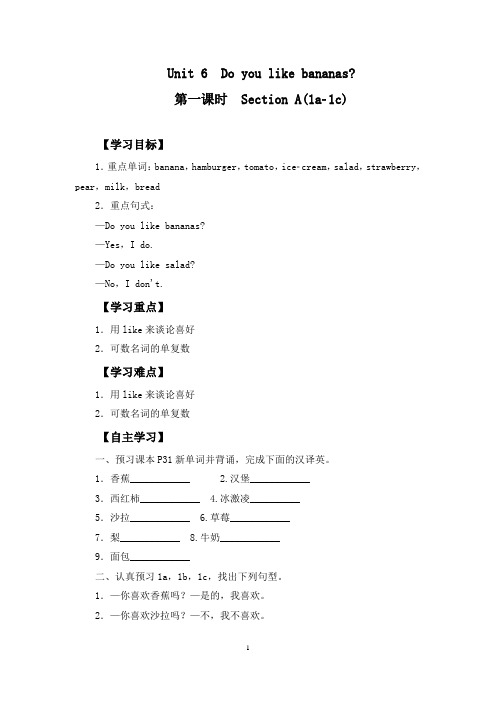
Unit 6 Do you like bananas?第一课时Section A(1a1c)【学习目标】1.重点单词:banana,hamburger,tomato,icecream,salad,strawberry,pear,milk,bread2.重点句式:—Do you like bananas?—Yes,I do.—Do you like salad?—No,I don't.【学习重点】1.用like来谈论喜好2.可数名词的单复数【学习难点】1.用like来谈论喜好2.可数名词的单复数【自主学习】一、预习课本P31新单词并背诵,完成下面的汉译英。
1.香蕉____________ 2.汉堡____________3.西红柿____________ 4.冰激凌__________5.沙拉____________ 6.草莓____________7.梨____________ 8.牛奶____________9.面包____________二、认真预习1a,1b,1c,找出下列句型。
1.—你喜欢香蕉吗?—是的,我喜欢。
2.—你喜欢沙拉吗?—不,我不喜欢。
【课堂导学】Step 1情景导入Teacher:There are many different kinds of fruits and vegetables in the world,and different people like different food.Everyone has its own taste.What kind of food do you like?What kind of food do you dislike?Today let's talk about the food we like and we dislike in Unit 6.环节说明:由学生感兴趣的话题导入新课,简洁明了,激起学生的学习兴趣。
人教新目标英语七上Unit6Doyoulikebananas教案4
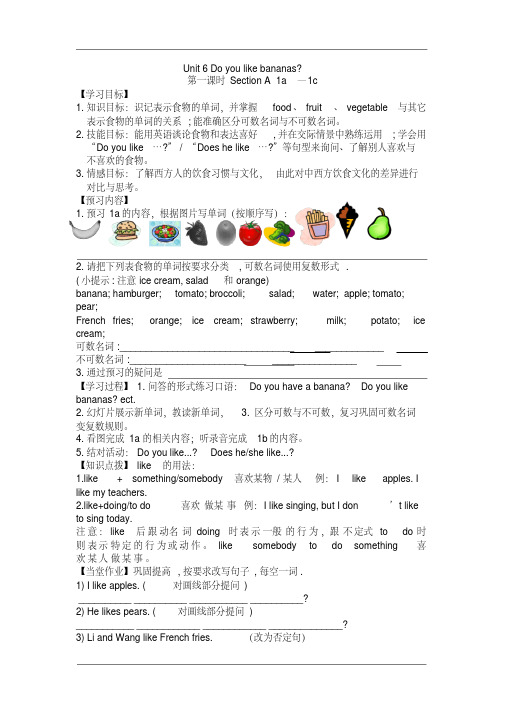
Unit 6 Do you like bananas?第一课时Section A 1a—1c【学习目标】1.知识目标:识记表示食物的单词,并掌握food、 fruit、 vegetable与其它表示食物的单词的关系;能准确区分可数名词与不可数名词。
2.技能目标:能用英语谈论食物和表达喜好,并在交际情景中熟练运用;学会用“Do you like…?” /“Does he like…?”等句型来询问、了解别人喜欢与不喜欢的食物。
3.情感目标:了解西方人的饮食习惯与文化,由此对中西方饮食文化的差异进行对比与思考。
【预习内容】1.预习1a的内容,根据图片写单词(按顺序写):2.请把下列表食物的单词按要求分类,可数名词使用复数形式.(小提示:注意ice cream, salad和orange)banana; hamburger; tomato; broccoli; salad; water; apple; tomato; pear;French fries; orange; ice cream; strawberry; milk; potato; ice cream;可数名词:_________________________________ _____________不可数名词:______________________ ________________3.通过预习的疑问是【学习过程】1.问答的形式练习口语:Do you have a banana? Do you like bananas? ect.2.幻灯片展示新单词,教读新单词,3.区分可数与不可数,复习巩固可数名词变复数规则。
4.看图完成1a的相关内容;听录音完成1b的内容。
5.结对活动:Do you like...? Does he/she like...?【知识点拨】like 的用法:1.like + something/somebody 喜欢某物/某人例:I like apples. I like my teachers.2.like+doing/to do喜欢做某事例:I like singing, but I don’t like to sing today.注意:like后跟动名词doing时表示一般的行为,跟不定式to do时则表示特定的行为或动作。
人教版英语七年级上册教案:Unit6 SectionB(2a-2c)

人教版英语七年级上册教案:Unit6 SectionB(2a-2c)Unit6 SectionB(2a-2c)教案【教材版本与册数】新目标人教版七年级上册【单元名称】Unit 6 Do you like bananas?【课时】Section B 2a-2c(第4课时)【课型】Reading(阅读课)教材分析【本单元话题】喜欢和不喜欢(like and dislike)【本单元重点掌握目标】行为动词在一般现在时句子中的使用,应该是上一个单元内容的延伸,通过本单元的教学,学生应初步掌握行为动词一般现在时的肯定句、否定句、特殊疑问句、一般疑问句的构成以及简单的回答和表示食物的可数名词和不可数名词。
【教材内容坼分分析】本单元Section A主要是谈论喜欢和不喜欢(like and dislike),Section B进一步拓展了此话题,按照“听力输入--阅读训练--由读促写”的过程逐层递进。
【通过本单元的学习学生需掌握的综合技能】训练学生的听、说、读、写四项基本技能,学会询问对方与了解别人喜欢与不喜欢的食物,学会谈论自己与他人早、中、晚餐喜爱吃的食物,为其今后能在交际中恰当地表达自己的情感、灵活运用已经学过的常用功能项目、进一步学习并掌握新的语言功能奠定坚实的基础。
第 2 页第 3 页DEL C2 获取新知Step2Reading1. T: Well, let’s see some sports star’s eating habits. Cindy Smith is avolleyball star. What does she like for breakfast, lunch and dinner? Doesshe eat ice-cream? Now let’s r ead the magazine article about Cindy Smith.First, read the article and circle the food words.(Ss read the article and circle the food words quickly.)2.Read the article and fill in the blanks.3. We know Cindy has healthy eating habits. What food does she like? Whatfood doesn’t she like? Read the article and write five sentences aboutCindy’s eating habits. e.g.Cindy likes fruit for breakfast.1.带着问题阅读文章,寻找答案2.再读文章,完成练习学生能够自主阅读文章并寻找答案第 4 页(注意运用句型:Cindy likes … for … 或Cindy doesn’t like/eat … for …)4. Let some Ss read their sentences to the class.5. Then finish 2c.Write five sentences about Ci ndy’s eating habits.Cindy likes healthy food.1. Cindy ___loves fruit.____________________________2. She ____likes oranges and bananas._____________________________3. She _____likes salad for lunch.____________________________4. Cindy doesn’t ___like hamburgers for dinner._____________________5. She doesn’t ___eat ice-cream after dinner._______________________Step3 Language points 1. Sports star eats well!句中的well用作副词,意为“好”,用来修饰动词eat,意为“吃得好”。
(水滴系列)七年级英语上册 Unit 6 Do you like bananas(第4课时)Sect

Unit6 Do you like bananas?Section B 2a-----3cLearning GoalsIn this lesson, the students learn to read and write a short passage about the food for three meals and describe what other people like to eat for three meals. Learn to get the good habit of eating healthily.Teaching and learning steps:Step1.ReviewingThree pairs role-play the dialogue in the first part of Section B in front of the class. The teacher can give an example like this:Sample dialogue:A: Do you like oranges?B: Yes, I do. What about you?A: No, I don’t. I like bananas.B: Oh, I see. Does Tom(可以是班内的任一学生) like carrots?A: No, he/she doesn’t. He/She likes tomatoes.B: …Step2. Warming up and leading inT: Hello, everybody! Do you like fruit?Ss: Yes, ...T: Is fruit healthy?Ss: Yes.T: Do you like hamburgers?Ss: Yes/No, …T: Are hamburgers healthy?Ss: No.T: Do you like the food of McDonald’s? Do you think the food there is healthy?Ss: Yes/No, …T: I think some food there are healthy, but some are not. Let’s e to 2a.Sample answers:(设计说明:通过师生互问答问题导入2a,重点引导生理解healthy一词的含义,因为它体现了2b语篇的核心思想。
【2013最新】新人教版七年级英语上册Unit 6 Do you like bananas?精美导学案(共11页)

2.不可数名词
3.兼可数与不可数名词:
二、写出下可数名词的复数形式。
1.Star2. apple3. watch
4. photo5.Backpack6.Tomato
7.key8. bus
9.strawberry10.Dicti onary
达标测试效果反馈
一、用所给单词的正确形式填空。
1. There are four _________ ( tomato) in the drawer.
Countable nouns
Uncountable nouns
Foods
Vegetables
Fruits
展示提炼拓展延伸
1.组内同学运用句型Do you like┅?及其回答Yes, I do./No, I don't.互相问答,
e.g. A: Do you like tomatoes, Zhang Xiang?
(1)一般情况_________________________________
(2)以辅音字母加y结尾的词______________________
(3)以s,x,sh,ch结尾的词__________________________
达标测试效果反馈
(一)写出下列单词的复数形式.
hamburger__________ dictionary_________ _ tomato_________ photo_________strawberry__________ banana__________ pear__________ orange_________
过程与方法:通过听说等一些活动培养良好的听力习惯和能力,再通过独学和小组合作,学会使用本单元重点句型。
人教版七年级上册英语Unit6Doyoulikebananas
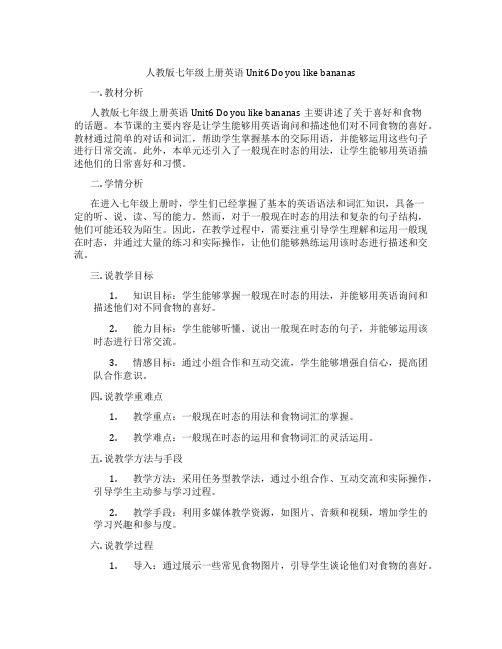
人教版七年级上册英语Unit6 Do you like bananas一. 教材分析人教版七年级上册英语Unit6 Do you like bananas主要讲述了关于喜好和食物的话题。
本节课的主要内容是让学生能够用英语询问和描述他们对不同食物的喜好。
教材通过简单的对话和词汇,帮助学生掌握基本的交际用语,并能够运用这些句子进行日常交流。
此外,本单元还引入了一般现在时态的用法,让学生能够用英语描述他们的日常喜好和习惯。
二. 学情分析在进入七年级上册时,学生们已经掌握了基本的英语语法和词汇知识,具备一定的听、说、读、写的能力。
然而,对于一般现在时态的用法和复杂的句子结构,他们可能还较为陌生。
因此,在教学过程中,需要注重引导学生理解和运用一般现在时态,并通过大量的练习和实际操作,让他们能够熟练运用该时态进行描述和交流。
三. 说教学目标1.知识目标:学生能够掌握一般现在时态的用法,并能够用英语询问和描述他们对不同食物的喜好。
2.能力目标:学生能够听懂、说出一般现在时态的句子,并能够运用该时态进行日常交流。
3.情感目标:通过小组合作和互动交流,学生能够增强自信心,提高团队合作意识。
四. 说教学重难点1.教学重点:一般现在时态的用法和食物词汇的掌握。
2.教学难点:一般现在时态的运用和食物词汇的灵活运用。
五. 说教学方法与手段1.教学方法:采用任务型教学法,通过小组合作、互动交流和实际操作,引导学生主动参与学习过程。
2.教学手段:利用多媒体教学资源,如图片、音频和视频,增加学生的学习兴趣和参与度。
六. 说教学过程1.导入:通过展示一些常见食物图片,引导学生谈论他们对食物的喜好。
2.新课呈现:引入一般现在时态的概念,并通过示例句子让学生理解一般现在时态的用法。
3.对话练习:让学生听录音或观看视频,模仿对话中的句子,并进行角色扮演。
4.小组活动:学生分组进行讨论,用英语询问和描述他们对食物的喜好。
5.巩固练习:通过完成练习题和互动游戏,让学生进一步巩固一般现在时态的用法。
七年级英语上册 Unit 6 Do you like bananas 课堂达标题 人教新目标版
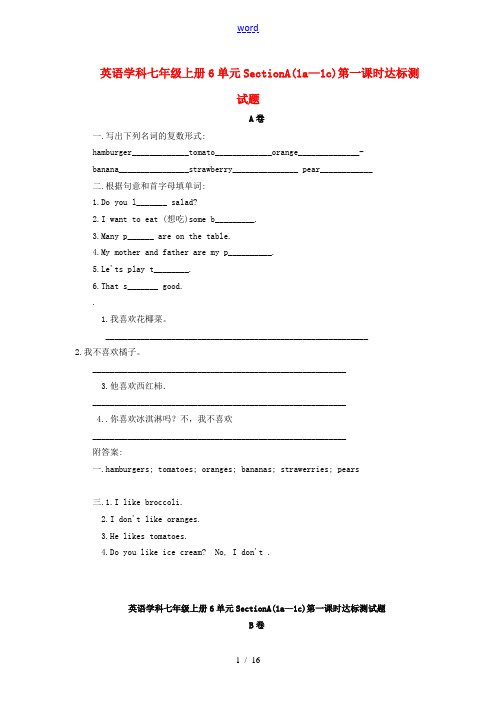
英语学科七年级上册6单元SectionA(1a—1c)第一课时达标测试题A卷一.写出下列名词的复数形式:hamburger_____________tomato_____________orange______________-banana________________strawberry_______________ pear____________二.根据句意和首字母填单词:1.Do you l_______ salad?2.I want to eat (想吃)some b_________.3.Many p______ are on the table.4.My mother and father are my p__________.5.Le'ts play t________.6.That s_______ good..1.我喜欢花椰菜。
____________________________________________________________2.我不喜欢橘子。
__________________________________________________________3.他喜欢西红柿.__________________________________________________________4..你喜欢冰淇淋吗?不,我不喜欢__________________________________________________________附答案:一.hamburgers; tomatoes; oranges; bananas; strawerries; pears三.1.I like broccoli.2.I don't like oranges.3.He likes tomatoes.4.Do you like ice cream? No, I don't .英语学科七年级上册6单元SectionA(1a—1c)第一课时达标测试题B卷一.用所给单词的正确形式填空:1.There are four ________ (tomato) in the drawer.2.Jeff likes _______ (strawberry) very much.3.Are these _________ (you)oranges?4..Sonia _______ (have) a sports collection.5.She _______(like) bananas.6.I _______( not like) math.7. She ________(play) sports every day.二.单项选择:1.These boys __________ hambergers.A.likesB. likeC.doesD. do2.He likes some _______.A.appleB. bananasC. broccolisD. salad3. Do ________ like French fries?A. heB. sheC. themD. you4. My mother __________ oranges and strawberries.A. don't likeB. doesn't likeC. doesn't likes5. Do they like broccoli?A. Yes, I doB. Yes, they doC. No, they do.6. Some _______ is in the bag.A. appleB. salad C tomato D. banana三.翻译下列句子:1.她不喜欢梨.____________________________________________________________2..你喜欢草莓吗?是的,我喜欢。
人教版七年级英语上册教案:Unit6 Section B(2a2c)
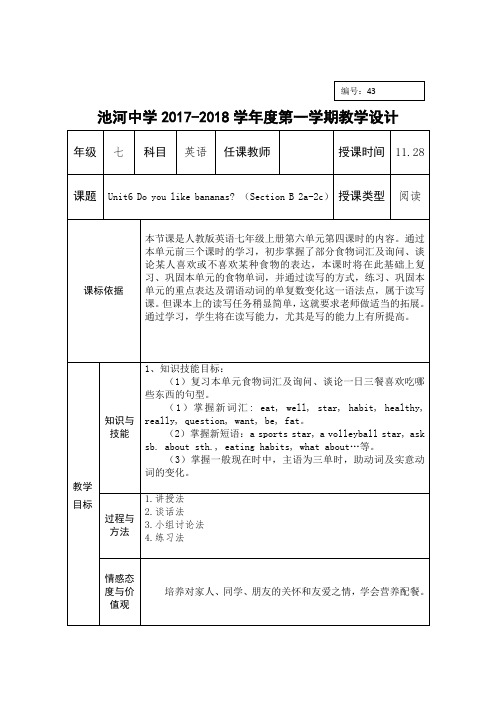
池河中学2017-2018学年度第一学期教学设计年级七科目英语任课教师授课时间11.28 课题Unit6 Do you like bananas? (Section B 2a-2c)授课类型阅读课标依据本节课是人教版英语七年级上册第六单元第四课时的内容。
通过本单元前三个课时的学习,初步掌握了部分食物词汇及询问、谈论某人喜欢或不喜欢某种食物的表达,本课时将在此基础上复习、巩固本单元的食物单词,并通过读写的方式,练习、巩固本单元的重点表达及谓语动词的单复数变化这一语法点,属于读写课。
但课本上的读写任务稍显简单,这就要求老师做适当的拓展。
通过学习,学生将在读写能力,尤其是写的能力上有所提高。
教学目标知识与技能1、知识技能目标:(1)复习本单元食物词汇及询问、谈论一日三餐喜欢吃哪些东西的句型。
(1)掌握新词汇: eat, well, star, habit, healthy, really, question, want, be, fat。
(2)掌握新短语:a sports star, a volleyball star, ask sb. about sth., eating habits, what about…等。
(3)掌握一般现在时中,主语为三单时,助动词及实意动词的变化。
过程与方法1.讲授法2.谈话法3.小组讨论法4.练习法情感态度与价值观培养对家人、同学、朋友的关怀和友爱之情,学会营养配餐。
编号:43教学重点难点教学重点A.Vocabularystar, eat, well, habit, healthy, really, question, want, be, fatB.Target languagesDo you like salad? I like chicken for dinner. I don’t like bananas.教学难点Grammar: Talk about likes and dislikes教学师生活动设计意图过程设计Step1. Lead-inGreeting and Warming upStep2. PresentationWhat do you eat for breakfast, lunch and dinner? Do you eat healthy food? Different people eat different foods. Which food do you think is healthy? Finish 2a, and discuss in pairs.Step3. ReadingRead and explain the title. What’s the meaning of “ sports star” ? What’s the meaning of “ Sports Star Eats Well” ?T: “A sports star” means a person who plays sports very well. Do you know a sports star?Yes,Yao Ming was a sports star. So what does the title mean? OK. “Sports Star Eats Well” means a sports star eats healthy food.You are going to read about a volleyball star. She has healthy eating habits. So what does she eat for breakfast, lunch and dinner?First guess the answers.Choose several students to answer. Then read about her answers to a reporter, David, and you will know.What does Cindy eat for breakfast / lunch/dinner?Check the answers.Read the article again. Answer the following questions.1. Why does Cindy like fruit?2. Why doesn’t Cindy like hamburgers?3. Why doesn’t Cindy eat ice-cream?Read it again and fill in the chart.Fill in the chart with t he food Cindy likes and doesn’t like. Cindy likes…Cindy doesn’t like…Read it again, explain any difficulty.Discussion.How can we keep healthy?What’s your advice?An apple a day keeps the doctor away.Eat healthy food and keep a balanced diet.Listen to the tape, students follow it.Retell the article according to the chart above.Step 4 Writing (Cooperation)Write five sentences , then correct the mistakes each other. 询问学生的喜好,吸引学生的学习兴趣。
人教版七年级英语上册教案(RJ) Unit 6 Do you like bananas

Unit 6Do you like bananas?第一课时Section A(1a-1c)1.重点单词:banana,hamburger,tomato,icecream,salad,strawberry,pear,milk,bread2.重点句式:—Do you like bananas?—Yes,I do.—Do you like salad?—No,I don't.1.用like来谈论喜好2.可数名词的单复数1.用like来谈论喜好2.可数名词的单复数一、预习课本P31新单词并背诵,完成下面的汉译英。
1.香蕉____________ 2.汉堡____________3.西红柿____________ 4.冰激凌__________5.沙拉____________ 6.草莓____________7.梨____________ 8.牛奶____________9.面包____________二、认真预习1a,1b,1c,找出下列句型。
1.—你喜欢香蕉吗?—是的,我喜欢。
________________________________________________________________________ 2.—你喜欢沙拉吗?—不,我不喜欢。
________________________________________________________________________Step 1情景导入Teacher:There are many different kinds of fruits and vegetables in the world,and different people like different food.Everyone has its own taste.What kind of food do you like?What kind of food do you dislike?Today let's talk about the food we like and we dislike in Unit 6.环节说明:由学生感兴趣的话题导入新课,简洁明了,激起学生的学习兴趣。
(完整word版)Unit6Doyoulikebananas讲解及练习
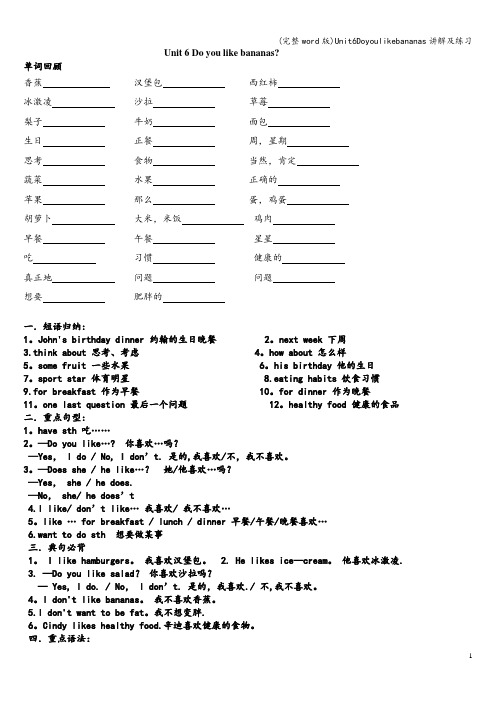
Unit 6 Do you like bananas?单词回顾香蕉汉堡包西红柿冰激凌沙拉草莓梨子牛奶面包生日正餐周,星期思考食物当然,肯定蔬菜水果正确的苹果那么蛋,鸡蛋胡萝卜大米,米饭鸡肉早餐午餐星星吃习惯健康的真正地问题问题想要肥胖的一.短语归纳:1。
John's birthday dinner 约翰的生日晚餐 2。
next week 下周3.think about 思考、考虑 4。
how about 怎么样5。
some fruit 一些水果 6。
his birthday 他的生日7。
sport star 体育明星 8.eating habits 饮食习惯9.for breakfast 作为早餐 10。
for dinner 作为晚餐11。
one last question 最后一个问题 12。
healthy food 健康的食品二.重点句型:1。
have sth 吃……2。
—Do you like…? 你喜欢…吗?—Yes, I do / No, I don’t. 是的,我喜欢/不,我不喜欢。
3。
—Does she / he like…?她/他喜欢…吗?—Yes, she / he does.—No, she/ he does’t4.I like/ don’t like…我喜欢/ 我不喜欢…5。
like … for breakfast / lunch / dinner 早餐/午餐/晚餐喜欢…6.want to do sth 想要做某事三.典句必背1。
I like hamburgers。
我喜欢汉堡包。
2. He likes ice—cream。
他喜欢冰激凌.3. —Do you like salad?你喜欢沙拉吗?— Yes, I do. / No, I don’t. 是的,我喜欢./ 不,我不喜欢。
4。
I don't like bananas。
我不喜欢香蕉。
5.I don't want to be fat。
七年级英语Unit 6Do you like bananas 人教版(新目标)知识精讲

初一英语Unit 6 Do you like bananas? 人教版(新目标)【本讲教育信息】一. 教学内容:Unit 6 Do you like bananas?(一)语言目标谈论爱好和厌恶。
(二)语言功能学会用英语表达自己喜欢或不喜欢的东西,询问别人是否喜欢,提出建议。
(三)重点句型Do you like bananas? Yes, I do./No, I don’t.I like French fries. I don’t like tomato es.(四)主题词表(五)重点词汇及短语词汇:like, hamburgers, tomatoes, broccoli, French fries, oranges, ice cream, salad, bananas, eggs, carrots, strawberry, apples, chicken, breakfast, lunch, dinner, fruit, vegetable.短语:a lot of like to do sth. like doing sth.(六)语法1. 动词like的用法。
2. 一般疑问句的肯定、否定回答。
3. 名词复数的使用。
(七)重难点分析:1. 可数名词和不可数名词(1)可数名词:①定义:是可以计数的名词。
②可数名词前可以用a,an限定。
③可数名词前可以用one,two,three…限定。
④可数名词有复数形式。
(2)不可数名词:①定义:指不能计数的名词。
②不可数名词前不可以用a,an限定。
③不可数名词前不可以用one,two,three…限定。
④不可数名词没有复数形式。
2. 一般名词的复数形式(1)一般在名词词尾加-s。
如:banana-bananas(2)以-o,-s,-sh,-ch及-x结尾的名词,在词尾加-es构成复数形式。
如:tomato-tomatoes (3)有些以-o结尾的名词仍加-s。
七年级英语上 Unit 6 Do you like bananas课时4 Section B (2
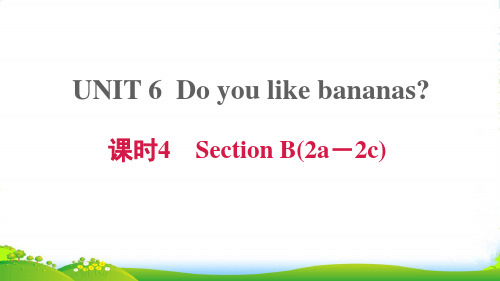
D. relaxing
B ( )14. —Do you eat _____?
—No, I don’t. I eat _____.
A. eggs; tomato
B. bananas; chicken
C. orange; bread
D. strawberry; pears
A ( )15. Sally is a _____ girl and I know
C. teacher
D. sport
( A )20. Jackson doesn’t want to be _____, so he never (从不) eats hamburgers.
A. fat B. healthy C. right D. same
三、根据汉语意思完成句子,每空一词。 21. 你有健康的饮食习惯吗? Do you have healthy ______ea_t_i_ng______h_a_b_i?ts
her _____.
A. good; well
B. well; good
【点拨C】. wgeollo;dw为ell形容词, 后可D接. g名oo词d;;gwoeoldl 用作形容词时, 意思为“健康的”, 本题中 用作副词, 意思为“好”, 修饰动词know。
( C )16. —My brother always plays sports in
parBen. tJsehnnayvehbasreicaed-carnedammailnkdfsoarlabdrfeoarkdfainsnt.eMr. y motCh.eJretnhniyn’kssfaththeeyr’rdeoehsena’lttlhiky.e可ve知geAta项bl正es.确。
Unit-6-Do-you-like-bananas讲解及练习

Unit 6 Do you like bananas单词回顾香蕉汉堡包西红柿冰激凌沙拉草莓梨子牛奶面包生日正餐周,星期思考食物当然,肯定蔬菜水果正确的苹果那么蛋,鸡蛋胡萝卜大米,米饭鸡肉早餐午餐星星吃习惯健康的真正地问题问题想要肥胖的一.短语归纳:’s birthday dinner 约翰的生日晚餐 week 下周about 思考、考虑 about 怎么样fruit 一些水果 birthday 他的生日star 体育明星 habits 饮食习惯breakfast 作为早餐 dinner 作为晚餐last question 最后一个问题 food 健康的食品二.重点句型:sth 吃……2.—Do you like…你喜欢…吗—Yes, I do / No, I don’t. 是的,我喜欢/不,我不喜欢。
3.—Does she / he like…她/他喜欢…吗—Yes, she / he does.—No, she/ he does’tlike/ don’t like…我喜欢/ 我不喜欢…… for breakfast / lunch / dinner 早餐/午餐/晚餐喜欢…to do sth 想要做某事三.典句必背1. I like hamburgers. 我喜欢汉堡包。
2. He likes ice-cream. 他喜欢冰激凌。
3. —Do you like salad 你喜欢沙拉吗— Yes, I do. / No, I don’t. 是的,我喜欢./ 不,我不喜欢。
don’t like bananas. 我不喜欢香蕉。
don’t want to be fat.我不想变胖。
likes healthy food.辛迪喜欢健康的食物。
四.重点语法:1.可数名词与不可数名词:从名词所表示的事物的性质来看,名词分为可数名词与不可数名词两类。
可数名词有复数形式,不可数名词一般没有复数形式。
①可数名词:可数名词是可以计数的,它们分为单数和复数两种形式。
Unit 6 Do you like bananas? 第四课时

Sharing our homework
Talk about your families.
I like … I don’t like … He/She likes … He/She doesn’t like … My father/mother likes ... My father/mother doesn’t like … They like … We like … They don’t like … We don’t like …
Who reads best?
Summary
Tips:
1. I like …, but I don’t like … He likes ..., but he doesn’t like … They like ..., but they don’t like …
2. If countable, we say “a banana” or “bananas”. If uncountable, we say “meat” or “some meat”.
Dinner
noodles, soup
My son likes
My son doesn’t like
salad
strawberries
meat
noodles
Write about you and your partner. My family’s meals For breakfast, I like _________________, but I don’t like ________________________________ . For lunch, ________________________________. For dinner, ___________________________ . … For breakfast, __________ likes _____________ . For lunch, ________________________________ . For dinner, ____________________________ . …
人教版初中英语七年级上册 Unit 6 大单元作业设计案例 (2)

Healthy Diet Happy Sports单元作业设计人教版七年级上册Unit6Do you like bananas?学科七年级英语题目Unit6Do you like bananas?CONTENT目录一、单元信息 (1)二、单元分析 (1)(一)课标要求 (1)(二)教材分析 (2)(三)学情分析 (3)三、单元学习与作业目标 (4)(一)单元学习目标 (4)(二)单元作业目标 (5)四、单元作业设计思路 (6)五、单元课时作业 (8)(一)第1课时 (8)(二)第2课时 (14)(三)第3课时 (20)(四)第4课时 (25)六、单元质量检测作业 (30)七、学生单元作业自我评价表 (37)基本信息学科年级 学期 教材版本 单元名称英语七年级第一学期人教版Unit 6 Do you like bananas?单元组织方式☑ 自然单元 □重组单元课时信息序号课型 教学内容 课时1听说课 Section A(1a-2d)第1课时2 语法课 Section A(Grammar Focus-3c)第2课时3阅读课 Section B(1a-2c)第3课时4写作课Section B(3a-Self Check)第4课时(一)课标要求本单元属于“人与自我”主题范畴中生活与 学习这一主题群,涉及子主题饮食与健康,个人 喜好与情感表达。
教材选编了多个语篇,包括对 话、采访、阅读等连续性文本和图表、图示等非 延续性文本以及音频视频等。
根据《义务教育英 语课程标准(2022年版)》要求,从语言技能、语 言知识、情感态度、学习策略、文化意识等方面 分析本单元的课程内容。
文音教育 英语课程标准(302年数) ***英语课程标准ALts1. 语言技能: 听懂关于饮食和对食物喜好的简短对话,用英语来表达自己与他人 一 日三餐喜欢吃的食物。
2. 语言知识: 学会区分可数与不可数名词,归纳总结名词复数的构成规律和使用 方法,正确运用行为动词的一般现在时。
U6限时作业

Unit 6 Do you like bananas? 限时作业第1课时总分10分一.用括号中所给词的正确形式填空.1.Here are some__________(西红柿)on the table.2.Do you like_________(苹果)?3.Do you like_________(面包)?4.They like __________(汉堡包).5.Tom and I ________(喜欢)bananas.二.单项选择1.I like bananas and_______.A.strawberryB.strawberrysC.strawberriesD.strawberres2.They like oranges,but they ______ pears.A.not likeB.don’t likeC.like notD.doesn’t like3.My friends ______ ice-cream.A.likeB.doesn’t likeC.likesD.eats4.Do you like apples?A.Y es, I don’t.B.Y es, I do.C.No, I do.D.Y es, I doesn’t.5.He likes ________.A.appleB.bananaC.orangeD.breadUnit 6 Do you like bananas? 限时作业第2课时总分12分一.选择1.( )--Does your son like carrots?---_________.A.Y es,she doesB.Y es, he isC.No,he doesn’tD.No,she doesn’t2.( )He has____ egg and ____ hamburger.A.an, anB.a,aC.an,aD.a,an3.( )There is a _____ shop.It sells bananas,apples,pears and oranges.A.vegetableB.foodC.fruitD.drink4.( )_____ your mother ____ carrots?A.Do,eatB.Is, eatC.Does,eatD.Are,eat5.( )Our friend _____ like salad.A.don’tB.doesn’tC.isn’tD.aren’t6.( )---Do they like hamburgers?---Y es,they like____ very much.A.itB.themC.theirD.its7.( )----_____ does Lucy like?----Tomatoes.A.HowB.WhatC.WhereD.Why 二.按要求完成下列句子1.They like vegetables.(用She代替They改写句子)_____________________________________.2.将下列句子分别改为否定句和一般疑问句She likes milk.否定句:___________________________.一般疑问句:____________________________.3.David doesn’t like salad.(改为肯定句)________________________________________.4.Bob likes fruit.(对画线部分进行提问)________________________________________.Unit 6 Do you like bananas? 限时作业第3课时总分10分一.单项选择1.( )---____ your cousin like ice-cream?---Y es,he likes it very much.A. DoesB.DoC.Don’tD.Is2.( )My parents like carrots, but they ___ like tomatoes.A.doB.don’tC.doesn’tD.does3.( )My parents often have hamburgers ____salad .A.orB.andC.withD.of4.( )_____vegetables do you like?A.HowB.WhereC.WhatD.Who5.( )I like _____ and _______.A.tomato,riceB.tomatoes,ricesC.tomatoes,riceD.tomato,rices6.( )Look! Some bread ___ in the bag, and somevegetables_____ in the basket.A.are, isB.are,areC.is ,isD.is, are7.( )Tom and Frank____ vegetables very much.A.likesB.eatsC.likeD.has二.给下列单词归类banana ice-cream pear apple strawberry bread milk tomato carrot riceegg chicken可数名词(写出其复数形式):不可数名词:Unit 6 Do you like bananas? 限时作业第4课时总分10分一.选择1.( )Tom likes eggs, oranges and bananas _____breakfast.A.inB.ofC.for C.on2.( ) For ____ lunch, she has some hamburgers.A.aB.anC.theD.\3.( ) What ___ she have ____ dinner?A.do,inB.does,forC.is ,atD.can,to4.( ) ---Do you like milk?----Y es, I like____ very much.A.itB.themC.drinkD.that5.( )My sister ____ some bread and milk for breakfast.A.haveB.hasC.eatsD.like6.( )I don’t eat ice-cream. I don’t want ______.A.fatB.be fatC.to be fatD.too fat二.翻译1. 你早饭喜欢吃什么?________________________?2. 你喜欢什么水果?__________________________?3. 我不喜欢香蕉,但我喜欢苹果。
Unit6Doyoulikebananas说课稿

Unit 6 Do you like bananas?说课稿说教材本课题选自人教版七年级英语上册第六单元Do you like bananas?本单元是以食物为主线,围绕着喜欢与不喜欢以及一日三餐等语言功能项目展开的一系列任务活动。
根据语言学科的特点,我将用听说读写玩等一系列活动培养学生的观察,记忆,思维,想象,创新能力与合作能力,完成知识的储备和能力的提高。
为了有效的实现学生综合能力的发展,我将本课目标设计如下:1.知识与技能目标:要学会本单元的新单词;掌握Do you like…?的句型并实现生活化的英语交流;能区分可数与不可数名词2.过程与方法目标:运用情景教学从视听入手,通过一系列辅助手段,创设语境,以实践训练为主,培训学生运用语言的能力,形成语言技能。
3.情感态度价值观目标:一方面通过小组共同探讨的方法,从而培养团体意识,共同学习的精神,提高学习效率。
个人也会在小组中,积极思考并表达,提高个人能力。
在了解教材的前提下,有清晰的目标,然而我们依旧需要有重点有突出的讲解本课内容,因此接下来我将说本课的,教学重难点:本单元为该册的第六单元,起着一个承上启下的作用,为什么说它是一个承上启下的作用呢?首先,学生们进入初中学习英语已经有一段时间了,基本的句型已经掌握,并且还掌握了一些日常的英语;其次,对于英语怎样学习,怎样高效的学习,在学生们的头脑中已经初步定型,这使得该单元成为一个过渡的单元;该单元会对一些句型进行进一步解释,也算是对前面的总结吧;最后,该单元学习的新识会在以后英语学习中广泛运用到的.根据本课学习Section A 的新单词,掌握喜欢与不喜欢的句型表达和学习可数和不可数名词的教学目标。
另外,结合学生前几个单元学习的实际情况,在已掌握一般疑问句的情况下,我将重点确立为:单词例如hamburger,broccoli等比较长,比较难记住的单词;句型Do you like…?yes,I do .no,I don’t.根据文化差异即中文与英语在描述具体名词的习惯表达上的差异,并且名词在英语学习中比重很大,名词又被分为种,例如物质名词,个体名词,集体名词等,使学生在理解可数名词与不可数名词上出现困难,又使之在正确运用冠词上出现困难。
Unit 6 Do you like bananas课文原文及语法重点
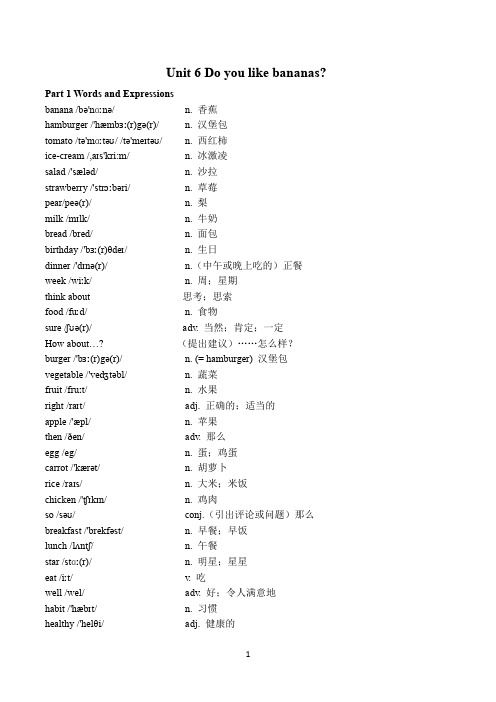
Unit 6 Do you like bananas? Part 1 Words and Expressionsbanana /bə'nɑːnə/ n. 香蕉hamburger /'hæmbɜː(r)gə(r)/ n.汉堡包tomato /tə'mɑːtəʊ/ /tə'meɪtəʊ/ n. 西红柿ice-cream /,aɪs'kri:m/ n.冰激凌salad /'sæləd/ n. 沙拉strawberry /'strɔːbəri/ n.草莓pear/peə(r)/ n. 梨milk /mɪlk/ n.牛奶bread /bred/ n. 面包birthday /'bɜː(r)θdeɪ/ n.生日dinner /'dɪnə(r)/ n.(中午或晚上吃的)正餐week /wiːk/ n.周;星期think about 思考;思索food /fuːd/ n.食物sure /ʃʊə(r)/ adv.当然;肯定;一定How about…? (提出建议)……怎么样?burger /'bɜː(r)gə(r)/ n. (= hamburger) 汉堡包vegetable /'vedʒtəbl/ n. 蔬菜fruit /fruːt/ n.水果right /raɪt/ adj.正确的;适当的apple /'æpl/ n.苹果then /ðen/ adv.那么egg /eg/ n.蛋;鸡蛋carrot /'kærət/ n.胡萝卜rice /raɪs/ n. 大米;米饭chicken /'tʃɪkɪn/ n. 鸡肉so /səʊ/ conj.(引出评论或问题)那么breakfast /'brekfəst/ n.早餐;早饭lunch /lʌntʃ/ n. 午餐star /stɑː(r)/ n.明星;星星eat /iːt/ v.吃well /wel/ adv. 好;令人满意地habit /'hæbɪt/ n.习惯healthy /'helθi/ adj. 健康的really /'riːəli/ adv. 真正地question /'kwestʃən/ n.问题want /wɒnt/ v. 需要;想要be /biː/ v.变成fat /fæt/ adj. 肥的;肥胖的Part 2:Texts课文(一)Jack: Hey, John’s birthday dinner is next week. Let’s think about the food. Tom: Sure. How about burgers, vegetable salad, and some fruit?Bill: Sounds good. John likes hamburgers.Jack: Oh, I don’t like salad.Bill:But John likes salad, and it’s his birthday.Jack:Yes, you’re right. What about the fruit?Tom: I think John likes strawberries and apples.Jack:OK. Let’s have strawberries and apples then.Structure——谈论好恶1.Do you like salad? Yes, I do./No, I don’t.2.Do they like pears? Yes, they do./ No, they don’t.3.Does she like tomatoes? Yes, she does./ No, she doesn’t.4.I like oranges. I don’t like bananas.5.We like rice. We don’t like hamburgers.6.He likes ice-cream. He doesn’t like vegetables.重点句型:Underline the correct words in the brackets.在括号内正确的单词下画线。
- 1、下载文档前请自行甄别文档内容的完整性,平台不提供额外的编辑、内容补充、找答案等附加服务。
- 2、"仅部分预览"的文档,不可在线预览部分如存在完整性等问题,可反馈申请退款(可完整预览的文档不适用该条件!)。
- 3、如文档侵犯您的权益,请联系客服反馈,我们会尽快为您处理(人工客服工作时间:9:00-18:30)。
Period4 3a-3c • 教学目标 教学目标: 1、Words: runner, eat, well, run, star, lot, lots of, healthy, dessert, list. Phrases: lots of=a lot of, running star, healthy food. 2、能够用英语叙述自己一天的饮食内容并形 能够用英语叙述自己一天的饮食内容并形 成文字。 成文字。 3、培养良好的饮食习惯,保持身体健康 培养良好的饮食习惯, 培养良好的饮食习惯
Practice 3a
• Read the text, and try to translate it with your partner. • Ask some students to translate. • Correct the faults. • Lead the students to read it.
Learn the text
• 1、Read the title(题目 and translate 、 题目) 题目 翻译) (翻译) it. • 2、Read the text, find out the preps.(介 、 介 词) • 3、Read again, then outline(画出 the 画出) 、 画出 phrases. • Check the answers. • 1、赛跑运动员吃得好 、 • 2、of, for. 、 • 3、running star, lots of , healthy food. 、
• 1、carrots and oranges 、 • 2 、broccoli and salad
Homework
• Read the material and pictures. Write a short text to introduce your meals. • eg. I eat lots of healthy food
every day. For breakfast, I …. 吃
well adv. 好,对,满意
• He plays basketball well.他打 篮球很棒。 • I eat well every day.我每天都 吃得很好。 • Tips: 副词一般用于动词之后, 副词一般用于动词之后, 动词之后 形容词之前。 形容词之前。
Finish 3b
• Write about what Tom likes to eat for breakfast, lunch and dinner. • Lead students to read the pictures, then lead them to fill in the blanks. • Check the answers:
run v.跑步,奔跑
star n. 星星,明星
lot adv. 许多,很多
• lots of = a lot of 大量的,许多的 大量的, • I have a lot of fruits. • I have lots of fruits.
• 此短语即可修饰可数名词,又可修饰 此短语即可修饰可数名词, 不可数名词。 不可数名词。
healthy adj. 健康的,强健 健康的, • health n. 健康 的 健康→healthy adj.健康的 健康的
dessert n.(饭后的)甜食
• 西方人饭后习惯吃甜食,如蛋糕, 西方人饭后习惯吃甜食,如蛋糕,冰淇 布丁等。 林,布丁等。
list n. 清单
•
• • • •
Phrase: name list, food list, make a list Practice the words: Read the words after the teacher. Read by yourselves. Read the words together.
